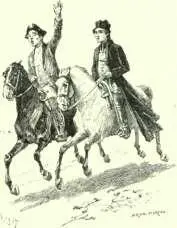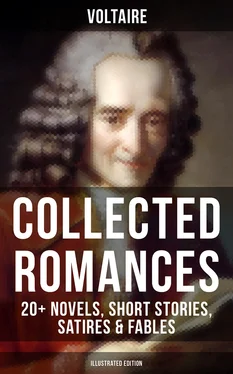Candide swore that nothing could be more true; and the tears began again to trickle down their cheeks. The baron knew no end of embracing Candide, he called him his brother, his deliverer.
“Perhaps,” said he, “my dear Candide, we shall be fortunate enough to enter the town, sword in hand, and recover my sister Cunegund.”
“Ah! that would crown my wishes,” replied Candide; “for I intended to marry her; and I hope I shall still be able to effect it.”
“Insolent fellow!” cried the baron. “You! you have the impudence to marry my sister, who bears seventy-two quarterings! really, I think you have an insufferable degree of assurance to dare so much as to mention such an audacious design to me.”
Candide, thunderstruck at the oddness of this speech, answered: “Reverend father, all the quarterings in the world are of no signification. I have delivered your sister from a Jew and an inquisitor; she is under many obligations to me, and she is resolved to give me her hand. My master, Pangloss, always told me that mankind are by nature equal. Therefore, you may depend upon it that I will marry your sister.”
“We shall see to that, villain!” said the Jesuit baron of Thunder-ten-tronckh, and struck him across the face with the flat side of his sword. Candide in an instant drew his rapier and plunged it up to the hilt in the Jesuit’s body; but in pulling it out reeking hot, he burst into tears.
“Good God!” cried he, “I have killed my old master, my friend, my brother-in-law; I am the best man in the world, and yet I have already killed three men; and of these three two were priests.”
Cacambo, who was standing sentry near the door of the arbor, instantly ran up.
“Nothing remains,” said his master, “but to sell our lives as dearly as possible; they will undoubtedly look into the arbor; we must die sword in hand.”
Cacambo, who had seen many of this kind of adventures, was not discouraged. He stripped the baron of his Jesuit’s habit and put it upon Candide, then gave him the dead man’s three-cornered cap and made him mount on horseback. All this was done as quick as thought.
“Gallop, master,” cried Cacambo; “everybody will take you for a Jesuit going to give orders; and we shall have passed the frontiers before they will be able to overtake us.” He flew as he spoke these words, crying out aloud in Spanish, “Make way; make way for the reverend father-colonel.”


CHAPTER XVI.
WHAT HAPPENED TO OUR TWO TRAVELLERS WITH TWO GIRLS, TWO MONKEYS, AND THE SAVAGES, CALLED OREILLONS.
Table of Contents
Candide and his valet had already passed the frontiers before it was known that the German Jesuit was dead. The wary Cacambo had taken care to fill his wallet with bread, chocolate, some ham, some fruit, and a few bottles of wine. They penetrated with their Andalusian horses into a strange country, where they could discover no beaten path. At length a beautiful meadow, intersected with purling rills, opened to their view. Cacambo proposed to his master to take some nourishment, and he set him an example.
“How can you desire me to feast upon ham, when I have killed the baron’s son and am doomed never more to see the beautiful Cunegund? What will it avail me to prolong a wretched life that must be spent far from her in remorse and despair? And then what will the journal of Trévoux say?” was Candide’s reply.
While he was making these reflections he still continued eating. The sun was now on the point of setting when the ears of our two wanderers were assailed with cries which seemed to be uttered by a female voice. They could not tell whether these were cries of grief or of joy; however, they instantly started up, full of that inquietude and apprehension which a strange place naturally inspires. The cries proceeded from two young women who were tripping disrobed along the mead, while two monkeys followed close at their heels biting at their limbs. Candide was touched with compassion; he had learned to shoot while he was among the Bulgarians, and he could hit a filbert in a hedge without touching a leaf. Accordingly he took up his double-barrelled Spanish gun, pulled the trigger, and laid the two monkeys lifeless on the ground.
“God be praised, my dear Cacambo, I have rescued two poor girls from a most perilous situation; if I have committed a sin in killing an inquisitor and a Jesuit, I have made ample amends by saving the lives of these two distressed damsels. Who knows but they may be young ladies of a good family, and that the assistance I have been so happy to give them may procure us great advantage in this country?”
He was about to continue when he felt himself struck speechless at seeing the two girls embracing the dead bodies of the monkeys in the tenderest manner, bathing their wounds with their tears, and rending the air with the most doleful lamentations.
“Really,” said he to Cacambo, “I should not have expected to see such a prodigious share of good nature.”
“Master,” replied the knowing valet, “you have made a precious piece of work of it; do you know that you have killed the lovers of these two ladies?”
“Their lovers! Cacambo, you are jesting! It cannot be! I can never believe it.”
“Dear sir,” replied Cacambo, “you are surprised at everything; why should you think it so strange that there should be a country where monkeys insinuate themselves into the good graces of the ladies? They are the fourth part of a man as I am the fourth part of a Spaniard.”
“Alas!” replied Candide, “I remember to have heard my master Pangloss say that such accidents as these frequently came to pass in former times, and that these commixtures are productive of centaurs, fauns, and satyrs; and that many of the ancients had seen such monsters; but I looked upon the whole as fabulous.”
“Now you are convinced,” said Cacambo, “that it is very true, and you see what use is made of those creatures by persons who have not had a proper education; all I am afraid of is that these same ladies may play us some ugly trick.”
These judicious reflections operated so far on Candide as to make him quit the meadow and strike into a thicket. There he and Cacambo supped, and after heartily cursing the grand inquisitor, the governor of Buenos Ayres, and the baron, they fell asleep on the ground. When they awoke they were surprised to find that they could not move; the reason was that the Oreillons who inhabit that country, and to whom the ladies had given information of these two strangers, had bound them with cords made of the bark of trees. They saw themselves surrounded by fifty naked Oreillons armed with bows and arrows, clubs, and hatchets of flint; some were making a fire under a large cauldron; and others were preparing spits, crying out one and all, “A Jesuit! a Jesuit! we shall be revenged; we shall have excellent cheer; let us eat this Jesuit; let us eat him up.”
“I told you, master,” cried Cacambo, mournfully, “that these two wenches would play us some scurvy trick.”
Candide, seeing the cauldron and the spits, cried out, “I suppose they are going either to boil or roast us. Ah! what would Pangloss say if he were to see how pure nature is formed? Everything is right; it may be so; but I must confess it is something hard to be bereft of dear Miss Cunegund, and to be spitted like a rabbit by these barbarous Oreillons.”
Читать дальше














